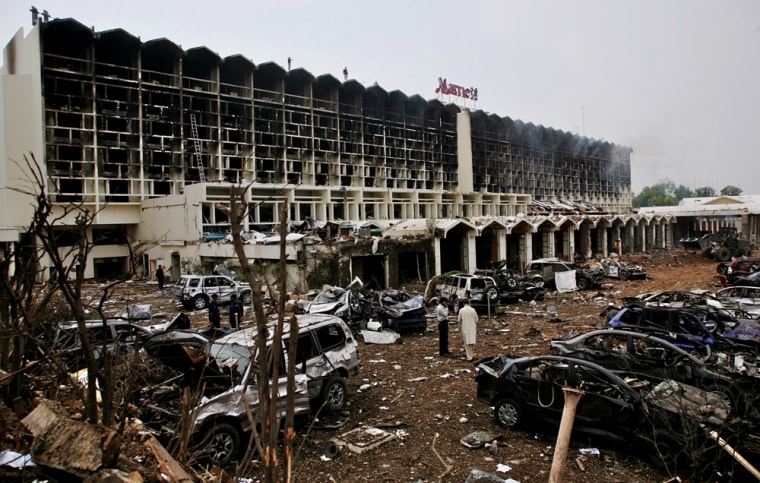Suicide attacks have killed almost 1,200 Pakistanis since July last year, most of them civilians, according to military statistics released Monday that highlight the ferocity of the militant threat facing the country.
Meanwhile, heavy fighting between Pakistani troops and insurgents on the Afghan border has sent some 20,000 Pakistanis fleeing into Afghanistan, the United Nations reported.
Under U.S. pressure, Pakistan launched a military offensive in its Bajur region in early August against Taliban and al-Qaida militants blamed for rising attacks in Pakistan and Afghanistan. Fierce fighting has raged ever since.
"In the last two weeks alone, over 600 Pakistani families (around 20,000 people) have fled into Afghanistan," the U.N. refugee agency said in a statement.
"While the vast majority of them are living with their relatives and friends, there are already some 200 families who live in the open air."
The families have fled to Afghanistan's Kunar province, which is itself plagued by fighting between militants and Afghan troops backed by coalition forces.
500,000 displaced in Bajur?
Pakistani officials say the fighting in Bajur has displaced as many as 500,000 people within the country. Most have found shelter with relatives across northwestern Pakistan, though about 100,000 are living in camps.
Nuclear-armed Pakistan has seen a surge in attacks by Islamic extremists since the July 2007 army siege on militants in Islamabad's radical Red Mosque, where about 100 people died.
Pakistani security officials regard the siege in the heart of the previously mostly peaceful capital as a watershed moment in the country's struggle against militancy.
The most recent major attack was the Sept. 20 suicide truck bombing of the Marriott Hotel in the capital, which killed at least 54 people, including three Americans.
Figures released at a military briefing in Islamabad showed 88 suicide attacks have taken place across Pakistan since the Red Mosque siege, killing 1,188 people.
Of that figure, 847 were civilians, while the rest were troops and police. More than 3,000 were listed as injured.
The number of attacks in that 15-month period is more than twice as many as in the previous five years, according to a database compiled by the South Asia Terrorism Portal, an India-based terrorism research Web site.
The military statistics showed 1,368 members of the security forces had died since 2001, when former President Pervez Musharraf sided with the United States in its war on terror.
Pakistan cites such figures in part to deflect criticism of its record and commitment to the fight against Islamic militants amid lingering suspicion the country's intelligence agencies maintain links with some of them.
In the latest fighting in the frontier region, security officials killed 35 militants in two clashes, a spokesman for the Frontier Corps said.
Overnight, troops repelled an attack on an army camp just north of Khar, Bajur's main town, killing up to 15 militants, two officials said.
There was no word of casualties on the government side. Poor access and security in Bajur prevents reporters from verifying casualty reports.
Also near Khar, eight tribesmen and three militants were killed in a gunbattle, said government official Fazal Rabbi.
He provided no more details on the clash, but the army is reportedly trying to enlist local support against the insurgents there.
Bajur is the most northerly of Pakistan's tribal regions, several of which have fallen largely under the control of militants opposed to the Afghan and Pakistani governments.
U.S. and NATO commanders say the insurgents use the region as a safe haven in which to plan attacks in Afghanistan, which is increasingly violent seven years after the downfall of the Taliban.
The area is believed to be a possible hiding place for Osama bin Laden and other al-Qaida leaders.
Maj. Gen. Jeffrey Schloesser, the top U.S. commander in eastern Afghanistan told The Associated Press last week he was encouraged by Pakistan's offensive in Bajur but hadn't yet seen a drop in the number of militants crossing the border.
"We need a persistent series of operations by Pakistan over a lengthier period of time before we see a change there," Schloesser said.
The army claims to have killed more than 1,000 militants in the Bajur offensive and lost 69 troops since August. It has declined to estimate casualties among civilians.
